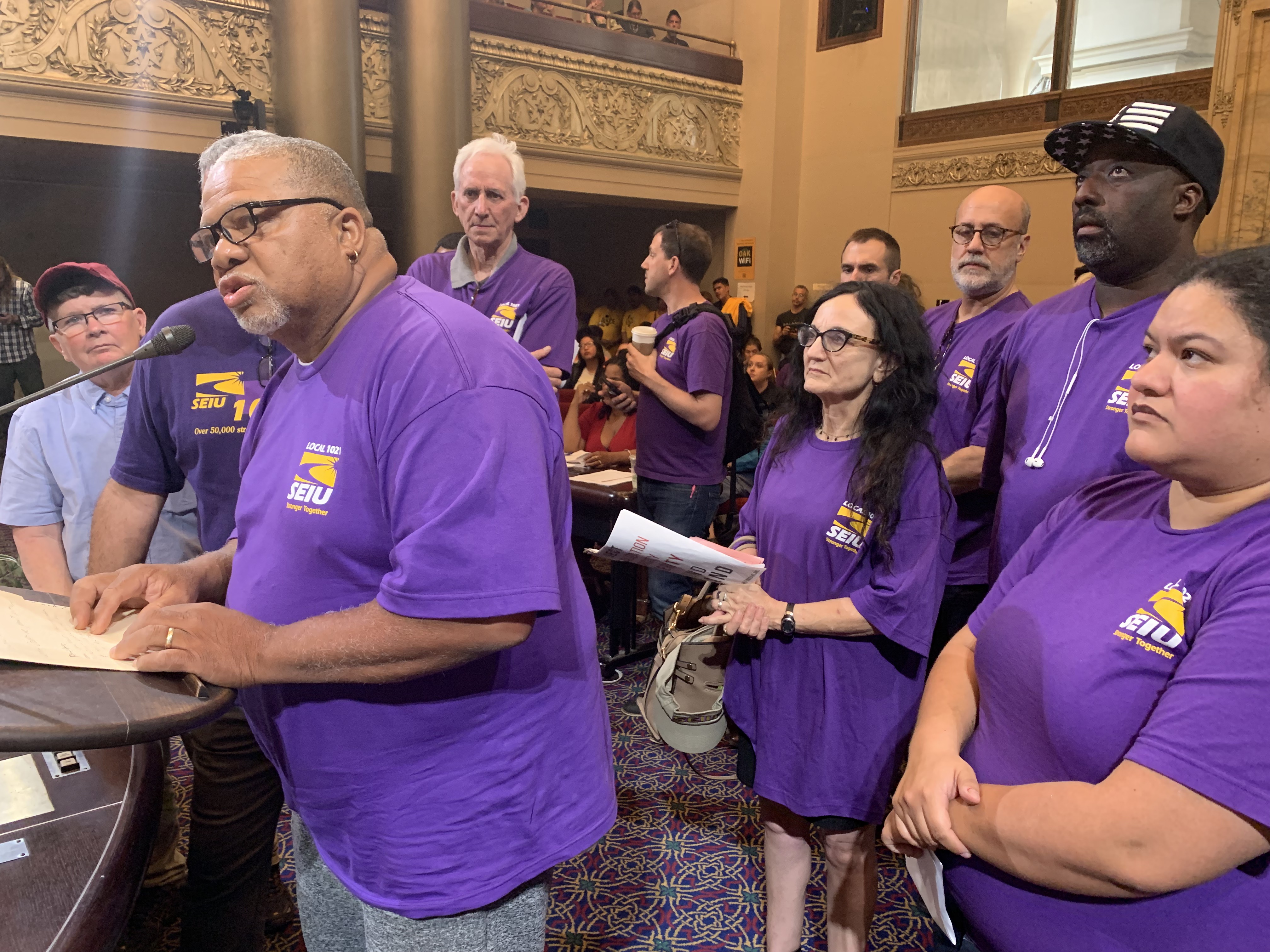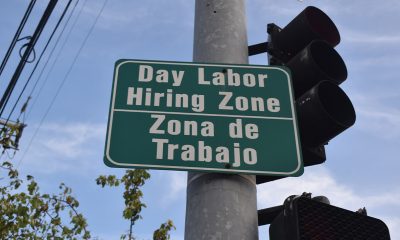City Government
Commentary: Budget Showdown in Oakland

Community says Schaaf’s budget hides $45 million ‘slush fund’
Oakland Mayor Libby Schaaf could have responded to City Council President Rebecca Kaplan’s amendments to her administration’s proposed $2.3 billion city budget with diplomacy and negotiations, as many City Hall observers had expected she would.
She could have recognized that Kaplan’s budget proposals were a response to the growing frustrations of city workers and Oakland communities who are tired of standing on the sidelines of a booming economy—illustrated by a skyline full of construction cranes. Year after year, City Hall produces austerity budgets that communities say starve the needs of local residents who are desperate for stable housing, an end to homelessness, clean and well maintained streets and parks, programs for marginalized youth and wildfire safety.
Schaaf could have realized that Kaplan’s budget recommendations do no not belong to the council president alone but are backed by neighborhood and community groups as well as supporters of the “People’s Budget,” proposed by the ReFund Community-Labor Coalition, which includes city worker unions SEIU Local 1021 and IFPTE Local 21, EBASE, EBHO, Causa Justa: Just Cause, ACCE Action, the Anti Police-Terror Project, Street Level Health Project and others.
Instead of taking the path of negotiating and deliberating, Mayor Schaaf and her administration chose to come out swinging, opting for a head-on confrontation with Kaplan and the progressives on the City Council, attacking the proposals as irresponsible and vigorously defending continued austerity measures in response to community needs. Her budget directs a huge share of the city’s income into business-as-usual funding to the Oakland Police Department and the unregulated pot of money that goes to police overtime, which costs residents about $30 million a year.
On Monday, June 10, on the same day a special City Council meeting was scheduled to discuss the Schaaf Administration’s budget proposal and the proposed amendments, the mayor sent out a blast email to local residents accusing Kaplan of “deceit and political pandering” and calling Kaplan’s budget amendment proposal “one of the most dangerous proposals I’ve ever seen to threaten Oakland’s future.”
In a move that upset many city workers, Schaaf’s city administrator, Sabrina Landreth, sent an email to all city employees titled “Update on Labor Negotiations and FY 2019-21 Budget,” dated June 6, denouncing Kaplan’s proposals for relying on “fictitious revenues” that could “potentially result in layoffs of filled positions in (the) Department of Transportation, the Clerk’s Office, OPD non-sworn and possibly employees in departments across the city.”
Speaking at Monday evening’s council meeting, Landreth refused to present a summary of the mayor’s budget to the public, saying there was no need to do that because staff had presented the proposal May 7 and that answers to questions from council members and the public had been posted online. Landreth repeatedly rebuffed Kaplan’s invitation to explain the Schaaf administration’s budget proposal to the public at Monday’s council meeting.
Mobilizing in support of the People’s Budget and Kaplan’s proposals that embodied many of them, hundreds of people packed the City Council meeting, marching up the stairs to the council chambers, with drums beating.
The main floor and the gallery seating were full to capacity, and an overflow room was opened for those who could not find a seat. The city clerk announced that 117 people had signed up to speak on the budget.
A report was presented at the meeting by Kristen Schumacher, staff researcher for Local 21, which showed that for the past seven years the administration purposely undercounted revenues by an average of $45 million a year.
Many saw this as a blow to the administration’s contention that Kaplan’s proposals were based on “fictitious revenues.”
This money, not included in the budget or in the City Council’s public budget deliberations, could eventually be spent by the administration and the mayor as they saw fit.
“Property taxes have been under-projected every single year, transient occupancy taxes have been under-projected every single year, and business license taxes have come in a minimum of $3.6 million higher and a maximum of $9 million higher over each of these seven years,” Schumacher said.
“The real estate transfer tax has been under-projected every single year by a minimum of $1.7 million and as much as $28 million,” she said. “In addition to these systematic under-projections, the vast majority of city departments underspend their budgets due to hundreds of vacancies in the non-sworn personnel budget.”
Referring to the mayor’s approach to budget deliberations, Dwight McElroy, chief steward for SEIU Local 1021, who works in the city’s paving division, said, “If there is an alternative point of view that may benefit the citizens of this city—who the money really belongs to—I don’t want to see mudslinging. I don’t want to see allegations. I don’t want to read about bully tactics.”

Dwight McElroy, chief steward, SEIU Local 1021, calls on the City Council to pass City Council President Rebecca Kaplan’s budget proposals. Photo by Ken Epstein.
The $45 million per year that was left out of the budget for seven years, said McElroy, “is restricted and has minimum use to benefit this city. You want to talk about fiction, the way you budget is a fiction.”
Felipe Cuevas, chapter president of SEIU 1021, a heavy equipment mechanic for the City of Oakland for 20 years, said, ”I just don’t understand the eagerness of our City Administrator Sabrina Landreth to harass our members with a threat of a layoff when we don’t even have a budget yet.
“If something like that would happen, if you were going to go by the rules, that would happen after you had a budget,” he said. “My union will be filing (unfair labor practice) charges over the harassment and intimidation by the city administration.”
Cat Brooks, executive director of the Justice Teams Network, said, “We here…in mass, united across race, class, ideology, profession as one Oakland. Rebecca Kaplan’s budget is the only budget that reflects the values of the city, that reflects the priorities of the people of this city,” she said. It is a budget that “puts Oakland on the path toward being the city that we profess to be, a city that is progressive and rooted in justice, equity and humanity.”
In her remarks, Kaplan denied that her proposal involved laying off union workers.
“There is no such proposal,” she said. “That was an inaccurate characterization, and I think that is part of why people feel there is a lack of respect going on—in terms of making statements that are untrue about the proposals.”
Explaining her understanding of budget deliberations, Kaplan said:
“Adopting a budget is one of the most important things we as a council do. It is our legal duty to deliberate and adopt a budget. And it is the administrative [duty] to ensure that it is implemented. How we allocate money and what we allocate it to is core to how we take action collectively as a council to ensure the needs of our city. This is a chance to put our goals and values into action by putting dollar amounts beside them.”
Budget proposals are scheduled to be discussed at the June 18 council meeting and again on June 24, if needed. The deadline for passing the completed budget is June 30.
Activism
Oakland Post: Week of November 26 – December 2, 2025
The printed Weekly Edition of the Oakland Post: Week of November 26 – December 2, 2025

To enlarge your view of this issue, use the slider, magnifying glass icon or full page icon in the lower right corner of the browser window.
Activism
Oakland Post: Week of November 19 – 25, 2025
The printed Weekly Edition of the Oakland Post: Week of November 19 – 25, 2025

To enlarge your view of this issue, use the slider, magnifying glass icon or full page icon in the lower right corner of the browser window.
Activism
IN MEMORIAM: William ‘Bill’ Patterson, 94
Bill devoted his life to public service and education. In 1971, he became the founding director for the Peralta Community College Foundation, he also became an administrator for Oakland Parks and Recreation overseeing 23 recreation centers, the Oakland Zoo, Children’s Fairyland, Lake Merritt, and the Henry J. Kaiser Convention Center.

William “Bill” Patterson, 94, of Little Rock, Arkansas, passed away peacefully on October 21, 2025, at his home in Oakland, CA. He was born on May 19, 1931, to Marie Childress Patterson and William Benjamin Patterson in Little Rock, Arkansas. He graduated from Dunbar High School and traveled to Oakland, California, in 1948. William Patterson graduated from San Francisco State University, earning both graduate and undergraduate degrees. He married Euradell “Dell” Patterson in 1961. Bill lovingly took care of his wife, Dell, until she died in 2020.
Bill devoted his life to public service and education. In 1971, he became the founding director for the Peralta Community College Foundation, he also became an administrator for Oakland Parks and Recreation overseeing 23 recreation centers, the Oakland Zoo, Children’s Fairyland, Lake Merritt, and the Henry J. Kaiser Convention Center.
He served on the boards of Oakland’s Urban Strategies Council, the Oakland Public Ethics Commission, and the Oakland Workforce Development Board.
He was a three-term president of the Oakland branch of the NAACP.
Bill was initiated in the Gamma Alpha chapter of Kappa Alpha Psi Fraternity.
In 1997 Bill was appointed to the East Bay Utility District Board of Directors. William Patterson was the first African American Board President and served the board for 27 years.
Bill’s impact reached far beyond his various important and impactful positions.
Bill mentored politicians, athletes and young people. Among those he mentored and advised are legends Joe Morgan, Bill Russell, Frank Robinson, Curt Flood, and Lionel Wilson to name a few.
He is survived by his son, William David Patterson, and one sister, Sarah Ann Strickland, and a host of other family members and friends.
A celebration of life service will take place at Henry J. Kaiser Convention Center (Calvin Simmons Theater) on November 21, 2025, at 10 AM.
His services are being livestreamed at: https://www.facebook.com/events/1250167107131991/
In lieu of flowers, donations can be made to the Euradell and William Patterson scholarship fund TBA.

-

 Activism3 weeks ago
Activism3 weeks agoOakland Post: Week of November 12 – 18, 2025
-

 Activism4 weeks ago
Activism4 weeks agoOakland Post: Week of November 5 – 11, 2025
-

 Activism2 weeks ago
Activism2 weeks agoIN MEMORIAM: William ‘Bill’ Patterson, 94
-

 Activism3 weeks ago
Activism3 weeks agoHow Charles R. Drew University Navigated More Than $20 Million in Fed Cuts – Still Prioritizing Students and Community Health
-

 Bay Area3 weeks ago
Bay Area3 weeks agoNo Justice in the Justice System
-

 #NNPA BlackPress3 weeks ago
#NNPA BlackPress3 weeks agoThe Perfumed Hand of Hypocrisy: Trump Hosted Former Terror Suspect While America Condemns a Muslim Mayor
-

 #NNPA BlackPress2 weeks ago
#NNPA BlackPress2 weeks agoTrump’s Death Threat Rhetoric Sends Nation into Crisis
-

 #NNPA BlackPress3 weeks ago
#NNPA BlackPress3 weeks agoProtecting Pedophiles: The GOP’s Warped Crusade Against Its Own Lies

























































